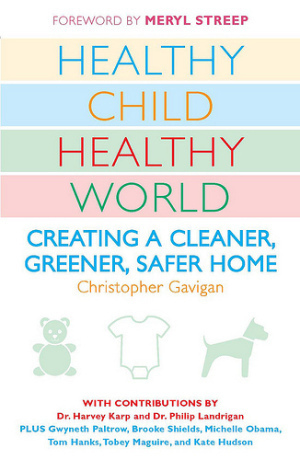
Did you know, that every day, you rely on household products that can contain thousands of untested and unregulated chemicals? How worried should we be about this reality?
This question was recently raised by Jerome Groopman for an article in the New Yorker entitled "The Plastic Panic" and it's a legitimate and widespread concern.
Over 80,000 synthetic chemicals are registered for use in commercial products in the United States and 700 new ones are introduced annually. Among the roughly 2,000 chemicals produced in quantities of more than a million pounds per year, only about 7% have undergone the recommended slate of basic toxicity studies! A shocking fact.
Americans simply assume that chemicals used to make ordinary products are tested for safety -- but they are not. From baby bottles made with bisphenol A (BPA) to carpets containing formaldehyde, dangerous chemicals are in our mattresses, home, places of work, and the products we use and the foods we eat every day. With each new scientific report linking toxic chemical exposure to a serious health problem, it becomes more obvious that the law intended to keep harmful chemicals in check -- the Toxic Substances Control Act (TSCA) of 1976 -- is not working.
One of the fundamental flaws of TSCA is that chemicals are innocent until proven guilty. But this line of thinking not only goes against basic common sense -- it also establishes the need for a foundation of proof that is nearly impossible to come by. Groopman explains,
"[t]here is an inherent uncertainty in determining which substances are safe and which are not, and when their risks outweigh their benefits. Toxicity studies are difficult, because BPA and other, similar chemicals can have multiple effects on the body. Moreover, we are exposed to scores of them in a lifetime, and their effects in combination or in sequence might be very different from what they would be in isolation. In traditional toxicology, a single chemical is tested in one cell or animal to assess its harmful effects. In studying environmental hazards, one needs to test mixtures of many chemicals, across ranges of doses, at different points in time, and at different ages, from conception to childhood to old age. Given so many variables, it is difficult to determine how harmful these chemicals might be, or if they are harmful at all, or what anyone can do to avoid their effects."
So, how worried should we be? There's definitely enough evidence for concern and it's abundantly clear we need a more effective way to regulate chemicals instead of pumping more and more into our products and crossing our fingers that it'll be okay. But, I don't believe worry is the appropriate reaction. Precaution is more effective.
Precaution is action taken in advance to prevent harm and it's an undeniable force once you become a parent. Outlet covers, car seats, gates at the top of stairs -- these are all precautionary tools. Parents make it a habit to take action in advance to prevent harm to their children. Precaution is easy and effective. It's a lifestyle of forethought and responsibility -- not fear or worry. Still, critics have a hard time distinguishing between the two.
Groopman quotes Elizabeth Whelan, of the American Council on Science and Health, a consumer-education group in New York (Whelan says that about a third of its two-million-dollar annual budget comes from industry), as saying, "The [chemical] fears are irrational. People fear what they can't see and don't understand. Some environmental activists emotionally manipulate parents, making them feel that the ones they love the most, their children, are in danger."
The fact is, our children are in danger -- we all are every day, and not just from toxic chemicals. Life is rife with danger. As parents, and often simply as people, we naturally try to reduce as many potential dangers as possible -- by wearing seat belts, looking both ways before crossing the street, locking doors, and thousands of other simple actions that are practical habits of precaution. We do these things to prevent harm -- because we are intelligent enough to use forethought, not because we are afraid of life.
Reducing exposure to unnecessary synthetic chemicals is practical precaution -- the new, responsible lifestyle in an age of chemical ubiquity. And, just as our increasing understanding of chemical risks compels us to take precautions as parents, this knowledge should also be applied to our government regulations. Smart policy uses forethought because, as the old adage goes, "an ounce of prevention is worth a pound of cure." The environmental, economic, and health crises we continue to face only serve to reinforce that fact we need to place more emphasis on prevention. I'm hoping that the recently introduced Safe Chemicals Act can be one piece in an array of new policies that will start infusing the wisdom of forethought into government regulation. Not because we are worried, but because we are responsible.

